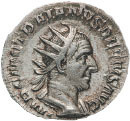Choosing how to follow the state is not a new question for Christians
The Christian response to Roman mandates in the 3rd century sheds light on the themes of faith, fear and church-state relations.
The Roman Republic transitioned to the Roman Empire shortly before the birth of Christ. With the rise of the empire, the men who became emperors gained great power to the point of godlike status.
Roman persecution of Christians varied by time and region. At the earliest stage of Christianity, Roman leaders viewed the religion as a variant of Judaism and therefore there was little persecution. As the authorities began to see Christianity as a separate and secret society, persecutions increased. The first imperial persecution of Christians began in AD 64 and was primarily the work of Emperor Nero.
It was paramount someone’s allegiance be to the emperor and state. Failing to worship the Roman empire was treasonous. Christians became a convenient scapegoat for frustrated emperors. In the eyes of most Romans, Christians lacked the necessary commitment and enthusiasm for worshipping an emperor and supporting the empire.
Ordinary Roman citizens who relied on pagan gods found Christians and their beliefs puzzling. The Romans had pagan priests, idols, rites and processions. Christians had none of these. Most Romans viewed Christians as atheists because they lacked visible gods. They assumed Christians hated Roman life. Of course, this was false. Christians simply refused to participate in social activities they viewed as pagan such as the theatre, sports and classical literature.
Christians were strange in other ways – they prayed silently, gathered for private meetings and participated in unusual practices such as the Lord’s Supper. Wild rumours arose that Christians ate babies "as a sacrifice to their God."
In the second half of the 3rd century, the Christian population of the Roman Empire was small but growing. Some found it increasingly troublesome. It was Emperor Decius, from AD 249 to 251, who attempted to reinstate the glory and power of Rome by restoring the ancient religion and gods. For the good of the whole society, the people were to embrace the government’s policy. Refusal was evidence of disloyalty and maybe selfishness.
 PHOTO: SHUTTERSTOCK.COM
PHOTO: SHUTTERSTOCK.COM
Decius’ edict was unique. He mandated that all Romans worship the Roman gods. Each Roman was to offer a sacrifice to the gods and burn incense to a statue of Decius. As proof of compliance they received a certificate. With an approximate population split of 10 per cent Christians and 90 per cent pagans, there was friction on the issue of certificates.
Christians understood offering a sacrifice to the gods conflicted with their love and trust for their Lord and Saviour. Besides, they knew the mandate was useless. How could Roman gods compete with the one true God of the universe? Christian rejection of pagan acts would not bring down the displeasure of the gods. Paganism was not the ultimate answer for an individual Roman or the empire.
Decius’ mandate represented an ultimatum rather than a choice, and Christians paid dearly. Without the certificate they were outlaws disobedient to the state. They failed to do their part for society. There were arrests, tortures and executions. One well-known martyr was Fabian, the bishop of Rome. It was a perilous time for Christians unwilling to comply with the state.
Decius’ mandate represented an ultimatum rather than a choice, and Christians paid dearly.
The historical record is incomplete, but it appears Christians received little sympathy from pagan Romans. The pagans were often a fearful people – their gods fell short in giving them lasting security and peace of mind. But they accepted their duty to be obedient to the state. Romans believed the Christians deserved persecution for their obstinacy and lack of civic-mindedness.
Christians did not respond in unison. As was the case in earlier Roman history, there were some who submitted to the state. Paul made it clear in his letter to the Romans (chapter 13) that followers of Christ were "to submit to the authorities." Of course, it was never an easy decision. Was there a legitimate limit to someone’s allegiance to a pagan state?
This episode of faith, fear and state power was brief. In AD 251 the Decian persecution ended. His reign was cut short prematurely when he died on the battlefield. He was emperor less than two years.
